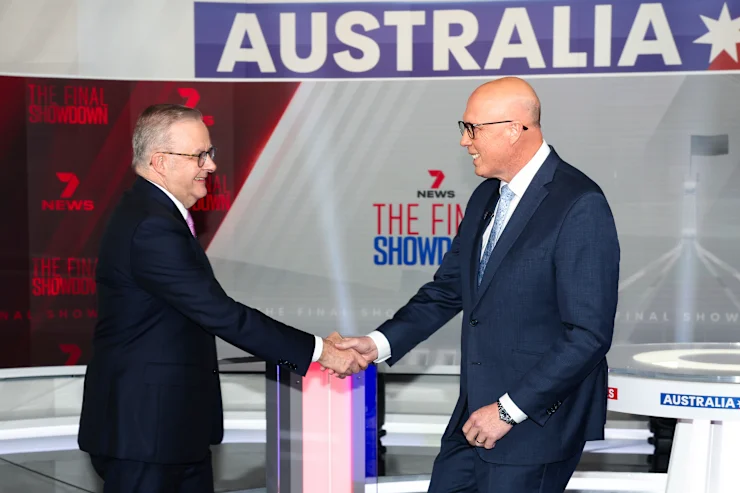In the final debate of Australia’s federal election, Prime Minister Anthony Albanese and Opposition Leader Peter Dutton engaged in a lively exchange, addressing key issues such as trust in US President Donald Trump and the country’s economic future. However, both leaders missed the mark on some critical points. During a tense moment, both leaders expressed surprising confidence in Trump, despite widespread skepticism among Australians and Americans. The debate also featured lighter moments, like a discussion on the price of eggs, but ultimately, neither leader gave a game-changing performance.
Albanese and Dutton’s Confidence in Trump Raises Eyebrows
The debate kicked off with a question from host Mark Riley, asking both leaders whether they trusted US President Donald Trump. Prime Minister Albanese was cautious at first, but quickly affirmed that he trusted Trump “100 percent.” When pressed on whether Australia could count on Trump for security, Albanese remained positive, stating, “Yes.” Opposition Leader Dutton took a more definitive stance, saying, “We can trust whoever’s in the Oval Office.”
This exchange struck many as surprising. A recent poll by Resolve Political Monitor found that 68% of Australians believe Trump’s presidency has been detrimental to the country. Additionally, a New York Times survey revealed that 66% of Americans view Trump’s administration as chaotic. These statistics reflect a growing lack of trust in the US president, making the leaders’ confident statements feel disconnected from public sentiment.
Debate Lacked Substance as Both Leaders Skirted Key Issues
The debate quickly devolved into a series of talking points, with both leaders talking over one another and missing opportunities to engage deeply with major issues like national security and economic policy. At one point, Dutton provoked Albanese by suggesting that the Welcome to Country ceremony was overdone, while Albanese stuck to safe responses.
Despite moments of tension, such as Dutton’s jab at Albanese’s knowledge of the price of eggs, the debate lacked meaningful engagement. When asked about the price of a dozen eggs, Dutton guessed $4.20, while Albanese estimated $7. In reality, the price is closer to $8, but neither leader’s guess seemed to have much bearing on the issues that matter most to voters.
Personal Moments and Economic Criticisms Stand Out
One of the more memorable moments came when Albanese was asked about his holiday home at Copacabana. The prime minister quickly responded with a personal story about his fiancé, Jodie Haydon, emphasizing that the home was purchased jointly. This brief but heartfelt moment gave Albanese a rare opportunity to humanize himself during the debate.
On the economic front, Albanese and Dutton clashed over cost-of-living issues. Dutton made sharp criticisms about the rising cost of living, while Albanese focused on the contrast between the Coalition’s temporary tax cuts and Labor’s promise of permanent tax relief. Albanese’s arguments on the economy were clear and consistent, while Dutton struggled to present a compelling vision for the future.
A Showdown Lacking Clear Winners
Despite the staged elements of the debate, including the 60-second time limits and dramatic music cues, the event felt more like a drawn-out exchange of talking points than a decisive moment. Mark Riley attempted to keep the leaders on track with real-time fact-checking, but much of what was said had already been heard in earlier debates.
In a lighthearted moment towards the end, Dutton interrupted Albanese as the prime minister discussed renewable energy, accusing him of “wrecking the economy.” Albanese, in turn, defended his stance, focusing on protecting the wages of working people.
The debate ended with both leaders having their fair share of memorable moments. However, it was clear that neither had delivered a knockout performance.
Verdict: A Draw with Few Surprises
In the end, the final debate did not offer any clear breakthroughs. Albanese remained steady on issues like the economy, while Dutton’s sharper criticisms of the cost of living failed to present a real alternative. While both leaders had their moments, there was little that would dramatically sway undecided voters.
With election day just a week away, the debate seemed to reinforce the existing narrative rather than alter it. As Australians prepare to head to the polls, the focus will likely remain on the leaders’ past performances and promises, rather than any new revelations from the debate.


